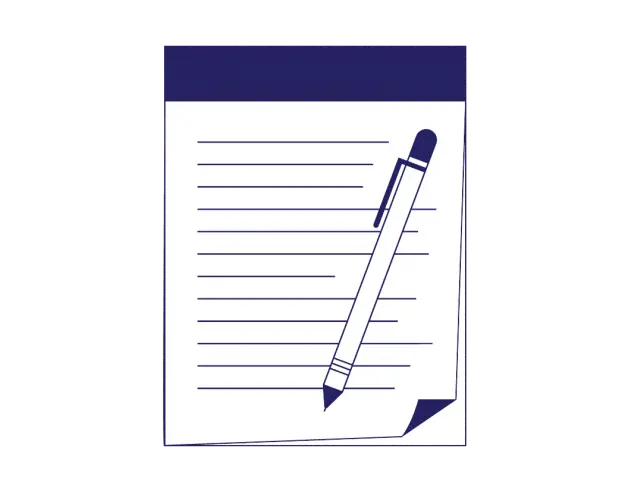- Link to facebook
- Link to linkedin
- Link to twitter
- Link to youtube
- Writing Tips

The Ultimate Guide to Getting Your Thesis Published in a Journal

7-minute read
- 25th February 2023
Writing your thesis and getting it published are huge accomplishments. However, publishing your thesis in an academic journal is another journey for scholars. Beyond how much hard work, time, and research you invest, having your findings published in a scholarly journal is vital for your reputation as a scholar and also advances research findings within your field.
This guide will walk you through how to make sure your thesis is ready for publication in a journal. We’ll go over how to prepare for pre-publication, how to submit your research, and what to do after acceptance.
Pre-Publication Preparations
Understanding the publishing process.
Ideally, you have already considered what type of publication outlet you want your thesis research to appear in. If not, it’s best to do this so you can tailor your writing and overall presentation to fit that publication outlet’s expectations. When selecting an outlet for your research, consider the following:
● How well will my research fit the journal?
● Are the reputation and quality of this journal high?
● Who is this journal’s readership/audience?
● How long does it take the journal to respond to a submission?
● What’s the journal’s rejection rate?
Once you finish writing, revising, editing, and proofreading your work (which can take months or years), expect the publication process to be an additional three months or so.
Revising Your Thesis
Your thesis will need to be thoroughly revised, reworked, reorganized, and edited before a journal will accept it. Journals have specific requirements for all submissions, so read everything on a journal’s submission requirements page before you submit. Make a checklist of all the requirements to be sure you don’t overlook anything. Failing to meet the submission requirements could result in your paper being rejected.
Areas for Improvement
No doubt, the biggest challenge academics face in this journey is reducing the word count of their thesis to meet journal publication requirements. Remember that the average thesis is between 60,000 and 80,000 words, not including footnotes, appendices, and references. On the other hand, the average academic journal article is 4,000 to 7,000 words. Reducing the number of words this much may seem impossible when you are staring at the year or more of research your thesis required, but remember, many have done this before, and many will do it again. You can do it too. Be patient with the process.
Additional areas of improvement include>
· having to reorganize your thesis to meet the section requirements of the journal you submit to ( abstract, intro , methods, results, and discussion).
· Possibly changing your reference system to match the journal requirements or reducing the number of references.
· Reformatting tables and figures.
· Going through an extensive editing process to make sure everything is in place and ready.
Identifying Potential Publishers
Many options exist for publishing your academic research in a journal. However, along with the many credible and legitimate publishers available online, just as many predatory publishers are out there looking to take advantage of academics. Be sure to always check unfamiliar publishers’ credentials before commencing the process. If in doubt, ask your mentor or peer whether they think the publisher is legitimate, or you can use Think. Check. Submit .
If you need help identifying which journals your research is best suited to, there are many tools to help. Here’s a short list:
○ Elsevier JournalFinder
○ EndNote Matcher
○ Journal/Author Name Estimator (JANE)
○ Publish & Flourish Open Access
· The topics the journal publishes and whether your research will be a good fit.
Find this useful?
Subscribe to our newsletter and get writing tips from our editors straight to your inbox.
· The journal’s audience (whom you want to read your research).
· The types of articles the journal publishes (e.g., reviews, case studies).
· Your personal requirements (e.g., whether you’re willing to wait a long time to see your research published).
Submitting Your Thesis
Now that you have thoroughly prepared, it’s time to submit your thesis for publication. This can also be a long process, depending on peer review feedback.
Preparing Your Submission
Many publishers require you to write and submit a cover letter along with your research. The cover letter is your sales pitch to the journal’s editor. In the letter, you should not only introduce your work but also emphasize why it’s new, important, and worth the journal’s time to publish. Be sure to check the journal’s website to see whether submission requires you to include specific information in your cover letter, such as a list of reviewers.
Whenever you submit your thesis for publication in a journal article, it should be in its “final form” – that is, completely ready for publication. Do not submit your thesis if it has not been thoroughly edited, formatted, and proofread. Specifically, check that you’ve met all the journal-specific requirements to avoid rejection.
Navigating the Peer Review Process
Once you submit your thesis to the journal, it will undergo the peer review process. This process may vary among journals, but in general, peer reviews all address the same points. Once submitted, your paper will go through the relevant editors and offices at the journal, then one or more scholars will peer-review it. They will submit their reviews to the journal, which will use the information in its final decision (to accept or reject your submission).
While many academics wait for an acceptance letter that says “no revisions necessary,” this verdict does not appear very often. Instead, the publisher will likely give you a list of necessary revisions based on peer review feedback (these revisions could be major, minor, or a combination of the two). The purpose of the feedback is to verify and strengthen your research. When you respond to the feedback, keep these tips in mind:
● Always be respectful and polite in your responses, even if you disagree.
● If you do disagree, be prepared to provide supporting evidence.
● Respond to all the comments, questions, and feedback in a clear and organized manner.
● Make sure you have sufficient time to make any changes (e.g., whether you will need to conduct additional experiments).
After Publication
Once the journal accepts your article officially, with no further revisions needed, take a moment to enjoy the fruits of your hard work. After all, having your work appear in a distinguished journal is not an easy feat. Once you’ve finished celebrating, it’s time to promote your work. Here’s how you can do that:
● Connect with other experts online (like their posts, follow them, and comment on their work).
● Email your academic mentors.
● Share your article on social media so others in your field may see your work.
● Add the article to your LinkedIn publications.
● Respond to any comments with a “Thank you.”
Getting your thesis research published in a journal is a long process that goes from reworking your thesis to promoting your article online. Be sure you take your time in the pre-publication process so you don’t have to make lots of revisions. You can do this by thoroughly revising, editing, formatting, and proofreading your article.
During this process, make sure you and your co-authors (if any) are going over one another’s work and having outsiders read it to make sure no comma is out of place.
What are the benefits of getting your thesis published?
Having your thesis published builds your reputation as a scholar in your field. It also means you are contributing to the body of work in your field by promoting research and communication with other scholars.
How long does it typically take to get a thesis published?
Once you have finished writing, revising, editing, formatting, and proofreading your thesis – processes that can add up to months or years of work – publication can take around three months. The exact length of time will depend on the journal you submit your work to and the peer review feedback timeline.
How can I ensure the quality of my thesis when attempting to get it published?
If you want to make sure your thesis is of the highest quality, consider having professionals proofread it before submission (some journals even require submissions to be professionally proofread). Proofed has helped thousands of researchers proofread their theses. Check out our free trial today.
Share this article:
Post A New Comment
Got content that needs a quick turnaround? Let us polish your work. Explore our editorial business services.
5-minute read
Free Email Newsletter Template
Promoting a brand means sharing valuable insights to connect more deeply with your audience, and...
6-minute read
How to Write a Nonprofit Grant Proposal
If you’re seeking funding to support your charitable endeavors as a nonprofit organization, you’ll need...
9-minute read
How to Use Infographics to Boost Your Presentation
Is your content getting noticed? Capturing and maintaining an audience’s attention is a challenge when...
8-minute read
Why Interactive PDFs Are Better for Engagement
Are you looking to enhance engagement and captivate your audience through your professional documents? Interactive...
Seven Key Strategies for Voice Search Optimization
Voice search optimization is rapidly shaping the digital landscape, requiring content professionals to adapt their...
4-minute read
Five Creative Ways to Showcase Your Digital Portfolio
Are you a creative freelancer looking to make a lasting impression on potential clients or...

Make sure your writing is the best it can be with our expert English proofreading and editing.
- Research Process
- Manuscript Preparation
- Manuscript Review
- Publication Process
- Publication Recognition
- Language Editing Services
- Translation Services

How to Write a Journal Article from a Thesis
- 3 minute read
- 247.8K views
Table of Contents
You are almost done with your PhD thesis and want to convert it into a journal article. Or, you’re initiating a career as a journal writer and intend to use your thesis as a starting point for an article. Whatever your situation, turning a thesis into a journal article is a logical step and a process that eventually every researcher completes. But…how to start?
The first thing to know about converting a thesis into a journal article is how different they are:
Thesis Characteristics:
- Meets academic requirements
- Reviewed by select committee members
- Contains chapters
- Lengthy, no word limits
- Table of contents
- Lengthy research of literature
- IRB approval described in detail
- Description and copies of tools used
- All findings presented
- Verb tenses may vary
Journal Article Characteristics:
- Meets journalistic standards
- Reviewed by a panel of “blind” reviewers
- Word limits
- Manuscript format
- Succinct research of literature
- IRB described in 1 to 3 sentences
- Essential and succinct tool information
- Selected findings presented
- Verb tenses are fairly consistent
Converting your thesis to a journal article may be complex, but it’s not impossible.
A thesis is a document of academic nature, so it’s more detailed in content. A journal article, however, is shorter, highlighting key points in a more succinct format. Adapting a thesis for conversion into a journal article is a time-consuming and intricate process that can take you away from other important work. In that case, Elsevier’s Language Editing services may help you focus on important matters and provide a high-quality text for submission in no time at all.
If you are going to convert a thesis into a journal article, with or without professional help, here is a list of some of the steps you will likely have to go through:
1. Identify the best journal for your work
- Ensure that your article is within the journal’s aim and scope. How to find the right journal? Find out more .
- Check the journal’s recommended structure and reference style
2. Shorten the length of your thesis
- Treat your thesis as a separate work
- Paraphrase but do not distort meaning
- Select and repurpose parts of your thesis
3. Reformat the introduction as an abstract
- Shorten the introduction to 100-150 words, but maintain key topics to hold the reader’s attention.
- Use the introduction and discussion as basis for the abstract
4. Modify the introduction
- If your thesis has more than one research question or hypothesis, which are not all relevant for your paper, consider combining your research questions or focusing on just one for the article
- Use previously published papers (at least three) from the target journal as examples
5. Tighten the methods section
- Keep the discussion about your research approach short
6. Report main findings in the results
- Expose your main findings in the results section in concise statements
7. Discussion must be clear and concise
- Begin by providing an interpretation of your results: “What is it that we have learned from your research?”
- Situate the findings to the literature
- Discuss how your findings expand known or previous perspectives
- Briefly present ways in which future studies can build upon your work and address limitations in your study
8. Limit the number of references
- To choose the most relevant and recent
- To format them correctly
- Consider using a reference manager system (e.g. Mendeley ) to make your life easier
If you are not a proficient English speaker, the task of converting a thesis into a journal article might make it even more difficult. At Elsevier’s Language Editing services we ensure that your manuscript is written in correct scientific English before submission. Our professional proofers and editors check your manuscript in detail, taking your text as our own and with the guarantee of maximum text quality.
Language editing services by Elsevier Author Services:

How to Choose a Journal to Submit an Article

How to Submit a Paper for Publication in a Journal
You may also like.

How to Write a Cover Letter for Your Manuscript? Here are the Tips and Examples

Publishing Biomedical Research: What Rules Should You Follow?

Writing an Effective Cover Letter for Manuscript Resubmission

Journal Acceptance Rates: Everything You Need to Know

Research Data Storage and Retention

How to Find and Select Reviewers for Journal Articles

How to Request the Addition of an Extra Author Before Publication

Paper Rejection: Common Reasons
Input your search keywords and press Enter.
Our website uses cookies to improve and personalize your experience and to display advertisements (if any). Our website may also include cookies from third parties like Google AdSense, Google Analytics, YouTube. By using the website, you consent to the use of cookies. We have updated our Privacy Policy. Please click on the button to check our Privacy Policy.

- Health Grants & Funds
- Fellowships in Health
- E-Health Courses
- PSC Syllabus
- PSC Health Notes
- PSC Supportive Docs
- Health PSC Practice Sets
- PSC Questions Collections
- Health Conferences/ Workshops
- Health Software/ Tools
- National Acts and Regs
- Health Acts and Regulations
- International Acts and Regs
- Health Plans & Periods
- Health Policies and Strategies
- Form & Formats
- Gov-Health Trainings
- Non-Gov-Health Trainings
- Annual Health Reports
- Health Fact Sheets
- Census Reports
- Health Surveys
- HEIC Materials
- E-Health Books
- Gov of Nepal-Official
- Other Health Notices
- Health Tips
- Digital Health (AI)
- Health Development Goals
- Universal Health Coverage (UHC)
- Non-Communicable Diseases (NCD)
- Infectious Diseases
- International Health Updates
- National Health Updates
- Health Worker’s Pen
- Pharma Updates
- Nursing Updates
- Epidemic and Outbreak
- Clinical Updates (Doctors and Others)
- CTEVT Syllabus
- Master’s Health Syllabus
- Bachelor’s Health Syllabus
- PCL Health Notes
- Bachelor Health Notes
- Master’ Health Notes
- Nep Health Academia
- International Health Academia
- Health Research Tools/Software
- Health Publications (Journal and Articles)
- Thesis Writing (Health)
- Questions Collections
- Health Programs Guidelines and Protocols
- Central Hospital
- Departments & Sections (MoHP & DoHS)
- Provincial Health Systems
- Local Health Systems
- International Health Day
- National Health Day
- Health Events
- Trending in Health
From Thesis to Published Success: A Step-by-Step Guide to Transforming Your Research into a Journal Article

Completing your thesis is a remarkable milestone. Turning it into a publishable manuscript can elevate your academic impact. It can also reach a global audience. Wondering how to get started? Here’s an engaging and practical guide to help you convert your thesis into a polished journal article ready for publication.
Step 1: Pinpoint the Core Contribution of Your Research
Your thesis likely covers a broad spectrum of topics, but a journal article demands focus. Start by identifying the heart of your research:
- Highlight Key Findings: What are the groundbreaking insights your research provides? Emphasize the aspects that make your work unique.
- Narrow Your Scope: Zoom in on a specific research question or hypothesis that your study answers thoroughly.
By focusing on your thesis’s most impactful contributions, you create a compelling foundation for your manuscript.

Step 2: Choose the Perfect Journal for Your Work
Selecting the right journal can make or break your publication journey. Follow these tips to find your best fit:

- Align with Journal Goals: Research journals that align with your topic and have a relevant readership.
- Review Submission Guidelines: Familiarize yourself with formatting, word count, and structural requirements.
- Consider Impact Factor: Choose a journal with an audience and prestige level that complements your goals.
Pro tip: Check out recently published articles to get a sense of the journal’s style and expectations.
Step 3: Adapt and Refine Your Thesis for a Journal Article
Your thesis may be extensive, but a journal article needs to be concise and to the point. Here’s how to trim and adapt effectively:
- Abstract: Craft a succinct summary highlighting your research question, methods, results, and conclusions.
- Introduction: Provide essential background, clearly define your research question, and establish its relevance.
- Methods: Focus on key techniques directly tied to your results.
- Results: Showcase only the most significant findings with supporting visuals like tables and figures.
- Discussion: Interpret your findings, connect them to existing literature, and discuss their implications.
- Conclusion: Wrap up with a brief conclusion, emphasizing your research’s impact and potential future directions.
Remember: Less is more. A focused manuscript is more likely to resonate with readers and reviewers.
Step 4: Polish Your Manuscript to Perfection
Editing and proofreading are essential to make your manuscript shine:
- Revise for Clarity: Ensure your language is concise and free of academic jargon.
- Check Grammar and Spelling: Tools like Grammarly or professional editing services can help refine your text.
- Format Properly: Follow the journal’s formatting guidelines meticulously to avoid unnecessary delays.
Step 5: Prepare for Submission Like a Pro
A successful submission requires more than just a great manuscript. Be sure to:
- Craft a Compelling Cover Letter: Briefly explain why your research fits the journal’s scope and its importance to the field.
- Double-Check Submission Requirements: Ensure you’ve included all necessary files, such as figures, tables, and supplementary materials.
Attention to detail here can leave a lasting impression on editors.
Step 6: Tackle Reviewer Feedback with Confidence
The peer-review process is an opportunity to strengthen your work. Here’s how to navigate it effectively:
- Respond Thoughtfully: Address reviewer comments comprehensively and provide detailed explanations for any changes you make.
- Resubmit Strategically: Include a response letter summarizing how you addressed feedback to reassure reviewers.
Remember, revisions are part of the journey. Constructive feedback only makes your research stronger.
Why Publishing Your Thesis Matters
Publishing your thesis as a journal article enhances your academic profile. It also contributes valuable knowledge to your field. By following these steps, you will transform your research into a professional manuscript. You will also increase its visibility and impact.
Take the leap from thesis to publication—your research deserves to be shared with the world. With persistence and attention to detail, you’re well on your way to academic success.
Ready to Publish? Start Today!
Turn your academic dreams into reality by converting your thesis into a publishable masterpiece. Follow this guide, stay dedicated, and watch your research make waves in the scholarly world.
How did reading this post make you feel? Cancel reply
You can share this:.

Discover more from Public Health Concern Nepal
Subscribe to get the latest posts sent to your email.
Type your email…
Related Posts

The Rise of Chronic Diseases and How Global Policies Are Addressing Them

Global Mental Health Trends: Stat, Challenges, Success Stories, and Policy Impacts

Mental Health Awareness: Recognizing and Managing Anxiety and Depression

Understanding Non-Communicable Diseases (NCDs): Prevention and Management
Subscribe now to keep reading and get access to the full archive.
Continue reading

- Call For Papers 2023
- Online Submission
- Authors GuideLines
- Publication Charge
- Registration
- Certificate Request
- Thesis Publication
- Journal Indexing
- How to publish research paper
- Research Paper Topics
- Editorial Board
- Peer Review & Publication Policy
- Ethics Policy
- Editorial Scope
- 2024- List of Thesis
- Online Thesis Submission
- Thesis Publication Detail
- January 2024 Edition
- February 2024 Edition
- March 2024 Edition
- April 2024 Edition
- May 2024 Edition
- June 2024 Edition
- July 2024 Edition
- August 2024 Edition
- September 2024 Edition
- October 2024 Edition
- November 2024 Edition
- December 2024 Edition
- January 2023 Edition
- February 2023 Edition
- March 2023 Edition
- April 2023 Edition
- May 2023 Edition
- June 2023 Edition
- July 2023 Edition
- August 2023 Edition
- September 2023 Edition
- October 2023 Edition
- November 2023 Edition
- December 2023 Edition
- January 2022 Edition
- February 2022 Edition
- March 2022 Edition
- April 2022 Edition
- May 2022 Edition
- June 2022 Edition
- July 2022 Edition
- August 2022 Edition
- September 2022 Edition
- October 2022 Edition
- November 2022 Edition
- December 2022 Edition
- January 2021 Edition
- February 2021 Edition
- March 2021 Edition
- April 2021 Edition
- May 2021 Edition
- June 2021 Edition
- July 2021 Edition
- August 2021 Edition
- September 2021 Edition
- October 2021 Edition
- November 2021 Edition
- December 2021 Edition
- January 2020 Edition
- February 2020 Edition
- March 2020 Edition
- April 2020 Edition
- May 2020 Edition
- June 2020 Edition
- July 2020 Edition
- August 2020 Edition
- September 2020 Edition
- October 2020 Edition
- November 2020 Edition
- December 2020 Edition
- January 2019 Edition
- February 2019 Edition
- March 2019 Edition
- April 2019 Edition
- May 2019 Edition
- June 2019 Edition
- July 2019 Edition
- August 2019 Edition
- September 2019 Edition
- October 2019 Edition
- November 2019 Edition
- December 2019 Edition
- January 2018 Edition
- February 2018 Edition
- March 2018 Edition
- April 2018 Edition
- May 2018 Edition
- June 2018 Edition
- July 2018 Edition
- August 2018 Edition
- September 2018 Edition
- October 2018 Edition
- November 2018 Edition
- December 2018 Edition
- January 2017 Edition
- February 2017 Edition
- March 2017 Edition
- April 2017 Edition
- May 2017 Edition
- June 2017 Edition
- July 2017 Edition
- August 2017 Edition
- September 2017 Edition
- October 2017 Edition
- November 2017 Edition
- December 2017 Edition
- January 2016 Edition
- February 2016 Edition
- March 2016 Edition
- April 2016 Edition
- May 2016 Edition
- June 2016 Edition
- July 2016 Edition
- August 2016 Edition
- September 2016 Edition
- October 2016 Edition
- November 2016 Edition
- December 2016 Edition
- January 2015 Edition
- February 2015 Edition
- March 2015 Edition
- April 2015 Edition
- May 2015 Edition
- June 2015 Edition
- July 2015 Edition
- August 2015 Edition
- September 2015 Edition
- October 2015 Edition
- November 2015 Edition
- December 2015 Edition
- January 2014 Edition
- February 2014 Edition
- March 2014 Edition
- April 2014 Edition
- May 2014 Edition
- June 2014 Edition
- July 2014 Edition
- August 2014 Edition
- September 2014 Edition
- October 2014 Edition
- November 2014 Edition
- December 2014 Edition
- Registration Form
- Copyright Transfer
- Scopus Indexing
JOURNAL CALL FOR PAPER
- Call for Paper 2023
- Publication Indexing
AUTHORHS & EDITORS
- Author Guidelines
THESIS PUBLICATION
- Submit Your Thesis
- Published Thesis List
- Thesis Guidelines
CONFERENCE SPONSERSHIP
- Conference Papers
- Sponsorship Guidelines
PUBLICATIONS
Ijser thesis publication, thesis publication with ijser – showcase your academic work.
The International Journal of Scientific and Engineering Research (IJSER) is a US based Journal dedicated to disseminating scholarly theses to a global academic audience. We provide a platform where Master's and Doctoral research thesis papers can be published and accessed by a global audience of fellow researchers, students, and academics.
Access our current Thesis Publications here .
Global Platform for Thesis Publication
- Embark on the final step of your academic journey with IJSER. Publish your thesis and ensure it is seen and cited by researchers internationally.
- Retain full rights to your academic thesis while allowing IJSER to distribute and showcase your work.
Open Access Thesis Availability
- IJSER's Gold Level open access policy ensures your thesis publication is free to download, increasing its potential impact.
- Your thesis will be optimized for visibility on Google Scholar, making it easy for peers to find and cite your work.
Quality Assurance and Ethical Standards
- Ethical research and submission practices are paramount at IJSER.
- We encourage submissions that are clear, concise, and uphold the highest academic standards.
- For authors where English is a second language, consider professional language editing to ensure your thesis meets publication standards.
Copyright and Support
- Granting IJSER the copyright license to publish your thesis does not relinquish your ownership. We protect your academic rights while ensuring wide dissemination.
- Our editorial team is ready to assist you through the publication process.
Celebrate and Share Your Published Thesis
- Receive your official digitally signed e-certificate from IJSER as a token of your published thesis.
- Your Thesis will be given a permanent dedicated page that highlights your academic profile.
Publish Your Thesis Now!
Begin by completing our Thesis submission form to obtain a unique ID for your work. Our dedicated Editorial Team will review your paper and get back to you within 3 business days.
IJSER: Where Your Thesis Achieves Global Academic Impact. Join the ranks of researchers who have chosen IJSER for their thesis publication, and let your work be recognized on an international scale.
- Call for Articles
- Login

How to Turn Your Thesis Into a Journal Article
In many cases, publishing thesis is often one of the requirements for graduate students to finish their academic program. Publishing research findings is one of the more important ways to share research data with the scientific community. However, the structure of it is different from that of a research article. In this article, we shall discuss how to turn your thesis to journal article.
Characteristics of a Thesis and a Journal Article
Differences between a thesis and a journal article.
While both contain similar sections, you cannot simply publish your thesis research as a journal article. Converting it into a journal article has many steps. It is important to recognize that an article is much shorter than the thesis. However, turning your thesis into a journal article will not be a simple matter of copy and paste. You will need to use the data in your thesis as the starting point for writing your article.
Related: Planning to publish your Ph.D. research in a good journal? Check these journal selection guidelines now!
The many differences between a thesis research and a journal article are as follows:
- A thesis meets academic requirements while a journal article meets journalistic standards.
- The abstract of an article is usually shorter than that of a thesis.
- The introduction in a thesis is used to show that you are familiar with the literature in your chosen field. In a research paper , the introduction is much shorter as it is assumed that your target audience is familiar with the necessary background to understand your work. The introduction to your paper will, therefore, focus more on setting the stage for the data/research output that you are about to present.
- The results section in a thesis will include all your findings. In a paper, this would be too much detail. The data in this section should be only what you need to support your research problem or hypothesis. Often, the results in former may represent two to three different papers.
- The discussion in your paper will be much more focused than in your thesis. It will be guided by the results presented in the paper. Finally, only citations of articles actually mentioned in your paper will be listed in the references section.
Turning Thesis Research to Journal Article
As a researcher, you need to publish your work to advance your career and make contributions to the research field. Now that the differences have been outlined, how do you actually write one?
1. Identify a Suitable Journal
You could start by journal selection . Look at your reference list. Chances are at least some of the papers you read were published in journals whose scope would match your work. Selecting a journal also allows you to tailor the paper to the specific requirements of that journal. Ensure that your research article coincides with the aim and scope of the journal. Understand the journal’s guidelines, recommended manuscript structure, and reference style
2. Reduce Redundant Length of Your Thesis
An important aspect of turning your thesis research to journal article is focusing on the word count without deleting crucial information. In order reduce word count , extract the data that answers just one research question. This should result in a more focused information than your thesis research presented. Discuss results in context with your problem statement-that is the focus of your paper. Good language and structure are crucial – your paper may get rejected even though it contains valuable data if it is difficult to understand. Use your data to tell a coherent story and avoid sweeping conclusions your data cannot support. Ensure that your title matches the contents of your paper. Paraphrase the content without changing the meaning.
3. Modify Introduction as Abstract
Repurpose the introduction as an abstract by shortening your thesis introduction to 100-150 words. Remember to maintain key points of the introduction to hold the reader’s attention. Formulate the introduction and discussion of thesis as basis for the journal article’s abstract. Furthermore, consider combining multiple research questions or focus on just one for the journal article.
4. Focus on Relevant and Selective Information
Since the discussion, methods and methodology, and results section of your thesis is an in-detail explanation of your research, these sections must be kept short while writing in a journal article. Familiarize yourself with the target journal’s standards by referring previously published papers and understanding their format. Most importantly, provide interpretation of main findings in the results section in concise statements or tabular formats. Avoid repeating your results in the discussion section. However, discuss how your findings expand and support previous perspectives of the research. Finally, mention how future studies can build upon your work and address limitations in your study.
5. Limit the Number of References
As your thesis is a work of several years put together, it involves numerous literature reviewing. However, while turning your thesis to journal article, you must include only limited references that are relevant to the research question addressed in the journal article. Focus on using most recent references. Consider using reference management tools such as Zotero, Mendeley, Quiqqa, etc. to make the referencing process easier and efficient.
It is an academic requirement that you publish your data for the benefit of the scientific community. Considering that the structure of journal article is different from the structure of a thesis, turning a thesis to journal article must be done following logical steps as mentioned above.
Did you ever have to convert your thesis to journal article? How did you plan it? What strategies did you use while reducing the word count of your thesis? Let us know in the comments section below! You can also visit our Q&A forum for frequently asked questions related to different aspects of research writing and publishing answered by our team that comprises subject-matter experts, eminent researchers, and publication experts.
I was Searching For This From So Many days. Thank you for Sharing
Thanks! Glad you liked it.
Are we also going to talk Code of Conduct in Research, as authorship is part of the conduct (ethics)?
Regards, Elvia

I guess you are referring to our upcoming webinar on Assigning Authorship & Contributorship | Tips for Researchers. We will be discussing the ethical dilemmas in authorship during the session.
We would request you to register and attend the webinar for additional insights on this topic.
Meanwhile, we would recommend you to share your queries with us on our FREE Q&A forum . In addition, you may download our FREE mobile app to stay updated on the latest resources in research writing and academic publishing.
What about the Topic? we need to rephrase the topic or keep it same with Thesis topic?
Hi Shahid, Thank you for your question. Your thesis topic would be a cumulative title for all the chapters described in your thesis. When you publish your thesis as a journal article, every chapter would be published as an individual article in most cases. You may or may not use the same title that you have used for that particular chapter in the thesis. Your thesis would have chapter names that are more suited to the overall objective of your thesis. On the other hand, your manuscript should ideally have a catchy and search-optimized title highlighting a general perspective. It may not be the same as your thesis title. However, if your thesis chapter title meets the requirement of the manuscript you intend to publish, you can go ahead with the same.
You could also go through our articles on writing good research paper titles: https://www.enago.com/academy/top-10-tips-on-choosing-an-attractive-research-title/ https://www.enago.com/academy/writing-a-good-research-title-things-to-avoid/ https://www.enago.com/academy/write-irresistible-research-paper-title/
Did you get a chance to install our FREE mobile app . Make sure you subscribe to our weekly newsletter: https://www.enago.com/academy/subscribe-now/ .
Hi Dr. Durga, Amazing article and I am sure it will surely help the writers to write more carefully and also plagiarised free.
Greeting from Enago Academy! Thank you for your positive comment. We are glad to know that you found our resources useful. Your feedback is very valuable to us. Happy reading!
i just read the article and also the comments section it’s so helpful. thank you so much for sharing it.. good work!
Thanks a lot for this informational blog which surely going to help the students pursuing the Phd. Nowdays due to assignment burden students started taking the help of professional academic experts. There are many writing services.
Thank you for the very useful article. I will definitely look into it.
Writing a book: needed advice and help at one point. I found enago academy in my search of Answers. You were a Great Help! I hope to use your services again, if I am stuck on correct writing principles! Thank You for being here. K.R. Plante
This helped me a lot; thank you for this informative article.
Thanks for writing such an informative blog which will surely be a great help for the students as well as the institutions
Great article! One question…. should I cite the thesis in the paper? If so, how do I do that efficiently since it would be all over the place?
good, insightful piece of text.
Rate this article Cancel Reply
Your email address will not be published.

Enago Academy's Most Popular Articles

- Reporting Research
Visualizing Meta-Analysis: Advanced plots and interactive tools
Meta-analysis is a statistical method that combines data from multiple studies to provide a clear…

- Career Corner
- PhDs & Postdocs
9 Practical Tips to Be a Better Academic Writer
Many graduate students are often concerned that academic writing is too difficult. This concern, however,…

Systematic Literature Review Vs. Meta-Analysis: Understanding evidence synthesis
Systematic reviews also known as Systematic Literature Reviews (SLRs) and meta-analyses are cornerstones of evidence-based…

- Old Webinars
- Trending Now
- Webinar Mobile App
Mastering Research Funding: A step-by-step guide to finding and winning grants
Identifying relevant funding opportunities Importance of eligibility criteria Understanding the funder’s perspective Crafting a strong…

Academic Webinars: Transforming knowledge dissemination in the digital age
Digitization has transformed several areas of our lives, including the teaching and learning process. During…
Mastering Research Grant Writing in 2024: Navigating new policies and funder demands
How to Create a Poster That Stands Out: Tips for a smooth poster presentation

Sign-up to read more
Subscribe for free to get unrestricted access to all our resources on research writing and academic publishing including:
- 2000+ blog articles
- 50+ Webinars
- 10+ Expert podcasts
- 50+ Infographics
- 10+ Checklists
- Research Guides
We hate spam too. We promise to protect your privacy and never spam you.
- Plagiarism Checker
- AI Content Detector
- Academic Editing
- Publication Support Services
- Thesis Editing
- Enago Reports
- Journal Finder
- Thought Leadership
- Publishing Research
- Promoting Research
- Diversity and Inclusion
- Industry News
- Al in Academia
- Other Resources
- Infographics
- Enago Learn
- On-Demand Webinar
- Open Access Week
- Peer Review Week
- Publication Integrity Week
- Conference Videos
- Call for speakers
- Author Training
I am looking for Editing/ Proofreading services for my manuscript Tentative date of next journal submission:

What features do you prefer in a plagiarism detector? (Select all that apply)

Research Guides
Submit and publish your thesis.
- The Graduate Thesis: What is it?
- Thesis Defences
- Deadlines and Fees
- Formatting in MS Word
- Formatting in LaTeX
- Making Thesis Accessible
- Thesis Embargo
- Review and Release
- Your Rights as an Author
- Re-using Third Party Materials
- Creative Commons Licenses for Theses
- Turning Thesis into an Article
- Turning Thesis into a Book
- Other Venues of Publication
Publishing from your thesis before or after graduation
"Will repository submission affect my publishing plans?"
... this is a common question for someone looking to publish from their thesis before or after graduation.
Most journals welcome submissions based on a thesis or dissertation. Some may have additional requirements, such as to:
- Let them know about the university’s requirement to make your thesis publicly available
- Submit a manuscript that is substantially different than the thesis content
- Embargo the thesis until after publication, etc.
Your steps will depend on the following scenarios:
Scenario 1 - you ARE NOT planning on publishing your thesis before or after graduation
In this case:
- You can submit your thesis without an embargo
- Your thesis will become publicly available in TSpace and Library and Archives Canada after your convocation and will be widely indexed via search engines and indexes
- Use the TSpace-generated permanent URL to share and cite your thesis - see example of such citation below
Tajdaran, K. (2015). Enhancement of Peripheral Nerve Regeneration with Controlled Release of Glial Cell Line-derived Neurotrophic Factor (GDNF) (Master’s Thesis, University of Toronto). Retrieved from http://hdl.handle.net/1807/74747
Scenario 2 - You ARE planning on publishing your thesis AFTER graduation
Most journals are interested in “original, previously unpublished” research. Some journals consider theses as a form of “prior publications”, others do not, and the majority does not have a clear definition. It will be best to check journal policy before you submit your thesis.
Nature Research will consider submissions containing material that has previously formed part of a PhD or other academic thesis which has been published according to the requirements of the institution awarding the qualification.
►►►How to check journal policies:
- MIT Libraries' list of policy excerpts from major publishers
- Journal’s website - usually under Information for Authors or Copyright / Permissions or Editorial Policy; or in the publication agreement if available online
- If such information cannot be located online, contact the editors directly
- If the journal requires that you place an embargo on your thesis until after publication, see the SGS instructions on how to request an embargo on your thesis .
Scenario 3 - You ARE planning on publishing (or have already published) from your thesis BEFORE graduation
You may want or be expected to publish parts of your thesis before your thesis is submitted, such as with an integrated/publication-based/sandwich thesis. The most important thing to keep in mind here is copyright. You own copyright of your written materials, and a publisher may require copyright transfer of your manuscript.
You need to ensure you retain certain rights or obtain permission in order to satisfy the university’s requirement of making your thesis openly accessible via TSpace, ProQuest and Library and Archives Canada (LAC). For more details on these repositories, see the Review and Release section of this guide.
Check whether the journal requires prior notification about U of T’s open access requirement for theses. Some journals want to be notified of this mandate whether or not they restrict the re-use of articles in theses.
Check whether the publisher requires copyright transfer . This should be stated on their website, in the publication agreement, or you can inquire directly with the journal.
If the publisher does not require copyright transfer , i.e. author retains copyright, then you can reuse your article/chapter in your thesis; no permission needed.
If the publisher requires copyright transfer , follow these steps:
Check if the publisher has special provisions for reusing your published work in your thesis. They may permit the inclusion of a non-final version, such as your submitted or accepted manuscript. See more below on understanding different article versions for sharing .
►►►How to check journal policies: See MIT Libraries' list of policy excerpts from major publishers or the journal/publisher website.
For example, Taylor and Francis policy allows to:
Include your article Author’s Original Manuscript (AOM) or Accepted Manuscript(AM) , depending on the embargo period in your thesis or dissertation. The Version of Record cannot be used. https://authorservices.taylorandfrancis.com/copyright-and-you/
Check if the article is distributed under a Creative Commons license. This may allow re-use.
►►►How to check journal's CC license: See the journal/publisher website or contact the journal directly.
If the publisher requires copyright transfer, has no special provisions and does not publish under a CC license, you will need to contact them to request permission to include your article in your thesis. You can:
- Negotiate making the article available as part of the thesis in TSpace, ProQuest, and LAC Theses Portal;
- Request an embargo [link to Lisa’ section on embargo] if the publisher only permits open sharing after some time post-publication;
- If permission is denied you may include in place of the chapter an abstract and a link to the article on the journal website.
If you have specific questions about your situation, publisher policy or author rights, contact the Scholarly Communications and Copyright Office at [email protected] for a consultation (best before you publish!)
Understanding different versions of a published article
A publisher may distinguish between the versions of an article that you may be allowed to include in your thesis:
- Submitted manuscript / pre-print - version you initially send in (often permitted)
- Accepted manuscript / post-print - version after peer review but before copyediting, layout editing, formatting, etc. (sometimes permitted; publisher may require an embargo/access restriction for a period of time)
- Version of record / final publisher’s PDF - version that appears in the journal (many publishers do not permit sharing this version)
►►►How to check article versions permitted for sharing:
- MIT Libraries’s list of policy excerpts from major publishers
- Sherpa/RoMEO database of publisher policies
- Journal’s website - usually under Information for Authors or Copyright/Permissions or Editorial Policy; or in the publication agreement if available online
- << Previous: Creative Commons Licenses for Theses
- Next: Turning Thesis into an Article >>
- Last Updated: Oct 10, 2024 5:26 PM
- URL: https://guides.library.utoronto.ca/thesis
Library links
- Library Home
- Renew items and pay fines
- Library hours
- Engineering
- UT Mississauga Library
- UT Scarborough Library
- Information Commons
- All libraries
University of Toronto Libraries 130 St. George St.,Toronto, ON, M5S 1A5 [email protected] 416-978-8450 Map About web accessibility . Tell us about a web accessibility problem . About online privacy and data collection .
© University of Toronto . All rights reserved. Terms and conditions.
Connect with us
How to create a journal article from a thesis
Affiliation.
- 1 School of Nursing and Midwifery, University of Queensland, Australia. [email protected]
- PMID: 22866554
- DOI: 10.7748/nr2012.07.19.4.21.c9220
Aim: To identify strategies to assist in the publication of research arising from a postgraduate thesis or dissertation.
Background: There are many benefits to publishing a journal article from a completed thesis, including contributing knowledge to the writer's chosen field, career enhancement and personal satisfaction. However, there are also numerous obstacles for the newly graduated student in crafting an article fit for a specialist publication from a thesis.
Data sources: The author conducted a search of the title, abstract and keywords of the Cinahl, Scopus and Proquest databases, from 1990 to 2010: The author searched for the words: 'journal article' or 'manuscript; 'thesis' or 'dissertation'.
Review methods: The author excluded papers if: they pertained to allocation of authorship to someone other than the academic adviser; related to undergraduate issues rather than graduate dissertations; were discussions of the merits of a PhD by 'publication' instead of 'by thesis'; were not published in a peer-reviewed journal; or were not in English.
Conclusion: The relationship between adviser and student changes as the student becomes a graduate, and new roles for the student and adviser need to be negotiated.
Implications for research/practice: Students need to realise that writing a paper from a thesis is usually going to be more difficult than they anticipate, but the application of strategies discussed in this paper should make the task manageable. Furthermore, universities might wish to consider alternatives in which published papers emerge before the examination of a thesis, such as requiring students to write a paper as part of their coursework.
- Academic Dissertations as Topic*
- Nursing Research*
- Periodicals as Topic*
- Publishing*

IMAGES
COMMENTS
Feb 25, 2023 · Writing your thesis and getting it published are huge accomplishments. However, publishing your thesis in an academic journal is another journey for scholars. Beyond how much hard work, time, and research you invest, having your findings published in a scholarly journal is vital for your reputation as a scholar and also advances research ...
1. Identify the best journal for your work. Ensure that your article is within the journal’s aim and scope. How to find the right journal? Find out more. Check the journal’s recommended structure and reference style; 2. Shorten the length of your thesis. Treat your thesis as a separate work; Paraphrase but do not distort meaning
Dec 12, 2024 · Transforming your thesis into a publishable manuscript is a rewarding journey that extends your academic impact and shares your research with the world. This step-by-step guide walks you through pinpointing your core findings, selecting the right journal, adapting your thesis to fit a journal article format, and navigating the submission process. Whether you're a first-time author or looking ...
Thus, the dissertation or thesis often provides the foundation for a new researcher’s body of published work. Writers will first want to determine whether the work in their dissertation or thesis merits publication. If it does, we then provide guidance on how to adapt a dissertation or thesis for submission to a journal.
and the institution. (Hawkins AR, et al, The Journal of Academic Librarianship) Editors and reviewers of peer-reviewed journals are experts in their fields and well versed in scholarly communication. Their task is to assess whether papers and projects further the knowledge and thus should be published.
The International Journal of Scientific and Engineering Research (IJSER) is a US based Journal dedicated to disseminating scholarly theses to a global academic audience. We provide a platform where Master's and Doctoral research thesis papers can be published and accessed by a global audience of fellow researchers, students, and academics.
Sep 5, 2023 · While both contain similar sections, you cannot simply publish your thesis research as a journal article. Converting it into a journal article has many steps. It is important to recognize that an article is much shorter than the thesis. However, turning your thesis into a journal article will not be a simple matter of copy and paste.
May 20, 2020 · Even if your dissertation or thesis was written in publication format and with a journal in mind, you will likely have to do a lot of tweaking and re-writing before it is ready to submit.
Oct 10, 2024 · Most journals welcome submissions based on a thesis or dissertation. Some may have additional requirements, such as to: Let them know about the university’s requirement to make your thesis publicly available; Submit a manuscript that is substantially different than the thesis content; Embargo the thesis until after publication, etc.
Background: There are many benefits to publishing a journal article from a completed thesis, including contributing knowledge to the writer's chosen field, career enhancement and personal satisfaction. However, there are also numerous obstacles for the newly graduated student in crafting an article fit for a specialist publication from a thesis.